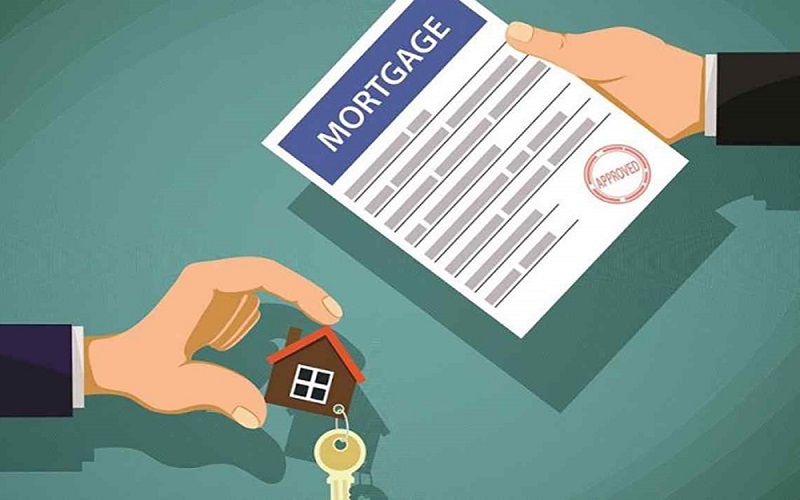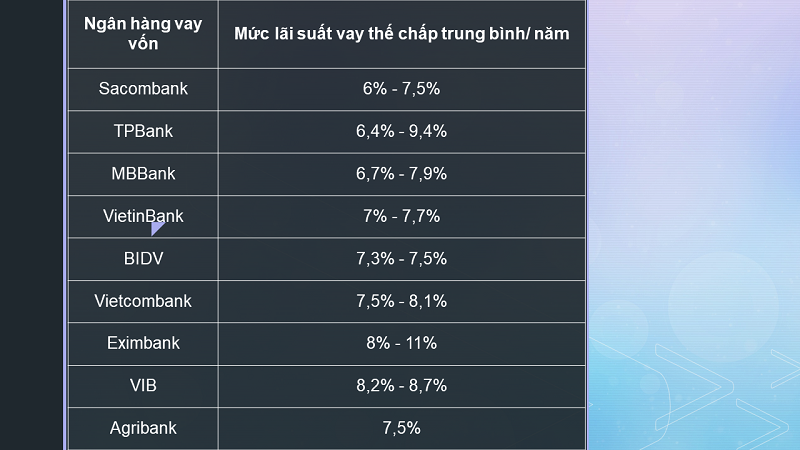Are you facing financial difficulties and interested in mortgage loans? Then don’t miss out on this article, as we will help answer all your questions!
1 What is a Mortgage Loan? Features of Mortgage Loans
Simply put, a mortgage loan is a type of loan where you borrow money from a bank by using your assets as collateral to secure the loan. The bank will evaluate your application to determine if you meet their eligibility criteria. They will also assess and appraise the value of your collateral, which can include assets such as cars, houses, land, or diamonds, to decide whether to approve your loan application.
 What is a Mortgage Loan? Features of Mortgage Loans
What is a Mortgage Loan? Features of Mortgage Loans
Features of Mortgage Loans:
– Collateral is required, and its value will be assessed by the bank.
– Mortgage loans offer very low-interest rates.
– The loan tenure is usually long-term.
– Flexible repayment options are available.
– The loan amount can be substantial, typically ranging from 70% to 80% of the value of the collateral.
2 Procedures and Process of Mortgage Loan with Land Use Rights Certificate
Banks nowadays accept various types of collateral for different loans, giving borrowers more options to choose from when deciding which asset to pledge to get a higher loan amount. However, the most common form of collateral is still the land use rights certificate.
You can mortgage your land use rights certificate, land papers, or real estate to borrow money for your personal needs and expenses.
 Procedures and Process of Mortgage Loan with Land Use Rights Certificate
Procedures and Process of Mortgage Loan with Land Use Rights Certificate
The procedure for a mortgage loan with a land use rights certificate is as follows:
– Proof of ownership of the collateral:
+ Citizen ID or ID card (not older than 15 years).
+ Permanent residence book.
+ Temporary residence registration certificate.
+ Land use rights certificate or purchase agreement with the borrower as the owner.
– Proof of income:
+ Electricity and water bills, or the latest three-month salary slip (for business employees, the slip must be at least six months old).
+ Business license and input/output invoices for economic activities.
The process of obtaining a mortgage loan with a land use rights certificate is as follows:
Step 1: Submit a copy of the land use rights certificate.
Step 2: Sign the land use rights certificate mortgage agreement, credit contract, and have the contract notarized.
Step 3: Register the secured transaction. After signing, your land use rights certificate will be updated to reflect that it is now owned by the bank from which you are borrowing.
Step 4: Disburse the loan amount.
3 Benefits of Mortgage Loans
 Benefits of Mortgage Loans
Benefits of Mortgage Loans
– This type of loan is ideal when you need large amounts of capital for investment purposes. Banks typically approve loan amounts ranging from 70% to 100% of the value of the collateralized asset.
– Mortgage loans offer very low-interest rates. In the initial years, the interest rate is usually between 6% and 8% per annum, and in subsequent years, it ranges from 10% to 12% per annum.
– The loan tenure is flexible and can be long-term, helping borrowers reduce their economic burden.
– With this type of loan, borrowers can rest assured that their assets are secure, and they can continue to use them as they wish.
4 Types of Mortgage Loans Available Today
Nowadays, with the increasing demand for mortgage loans, banks offer a diverse range of mortgage loan options. The most common types of mortgage loans available at banks include:
Mortgage Loan for Buying a Car: With this loan type, borrowers can use the car they are purchasing as collateral for the loan. This process is now faster and more straightforward than ever.
Most banks offer this type of loan and provide attractive incentives. Interest rates vary from bank to bank, typically ranging from 7% to 13%.
Mortgage Loan for Buying Land, Houses, or Apartments: This is a common type of loan offered by banks. When applying for a mortgage loan to buy real estate, you may be able to borrow up to 100% of the value of the property you wish to purchase.
The loan tenure can range from 15 to 25 years, depending on the collateralized asset, your monthly income, and your financial needs. The approved loan amount can be in the millions or even billions, depending on your financial situation and ability to service the loan.
 Types of Mortgage Loans Available Today
Types of Mortgage Loans Available Today
Mortgage Loan for Business Purposes: This type of loan is designed to quickly address financial issues related to business expansion and development. The average interest rate for this type of mortgage loan currently ranges from 7% to 9% per annum.
Mortgage Loan for Studying Abroad: This loan type caters to the financial needs of students who wish to pursue their education at overseas institutions. The maximum loan tenure can be up to 25 years, and you may be approved for a substantial loan amount, ranging from 70% to 90% of the value of the collateral. The interest rate is also quite favorable, typically between 6% and 9% per annum.
Mortgage Loan for Consumption: This type of mortgage loan with collateral is designed to quickly meet the borrower’s financial needs for personal consumption. It gives borrowers more control over how they use the loan amount to meet their various consumption needs.
5 Mortgage Loan Interest Rates
Mortgage loan interest rates vary from bank to bank, but they typically range from 10% to 16% per annum. Additionally, banks often launch promotional campaigns and offer gifts and discounts on interest rates, so the interest rate applied during the initial period of the mortgage loan can be very low, ranging from 6% to 11% per annum.
 Mortgage Loan Interest Rates at Some Banks
Mortgage Loan Interest Rates at Some Banks
Note: The above-mentioned interest rates are for reference only and may change from time to time. For the most up-to-date information, please visit your nearest bank branch.
We hope that the information provided above will help you choose a mortgage loan that suits your financial needs and situation.
See also:
>>
>>
>>
































